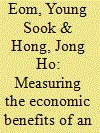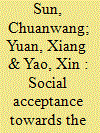|
|
|
Sort Order |
|
|
|
Items / Page
|
|
|
|
|
|
|
| Srl | Item |
| 1 |
ID:
099315


|
|
|
|
|
| Publication |
2010.
|
| Summary/Abstract |
One of the most important issues related to sustainability is to reduce the use of fossil fuels due to the reduction in greenhouse gases (GHG) emission. Nuclear power results in low carbon emissions and is thus important to mitigating the adverse effects of global warming and climate change. However, the downside of nuclear power cannot be overlooked, and consequently nuclear power is a controversial issue in many countries around the world. Thus an important question concerns how people should support nuclear power. Do the climate and energy security benefits of nuclear power outweigh its risks and costs? Therefore, we use a modified double-bounded contingent valuation model to explore the attitudes and the willingness to pay (WTP) of a country in order to demonstrate its implications for policy. We confirm that supporters and opponents of nuclear power are balanced both in terms of their numbers and in terms of their WTP. The policy implication is that people do not support any dramatic increase or reduction in nuclear power, and that nuclear power should still be an important means of generating electricity in Taiwan. The current share of nuclear power in electricity generation of 20% should be maintained in the near future.
|
|
|
|
|
|
|
|
|
|
|
|
|
|
|
|
| 2 |
ID:
137664


|
|
|
|
|
| Summary/Abstract |
South Korea is experiencing a serious imbalance in electricity supply and demand, which caused a blackout in 2011. The Korean government has planned to perform a rolling blackout to prevent large-scale blackouts when the electricity supply reserve margin reaches less than 1 million kW. This study attempts to estimate the inconvenience cost of household customers from a rolling blackout by using survey data. To this end, we apply a contingent valuation method (CVM) to measure their willingness-to-pay (WTP) in order to avoid a rolling blackout, i.e. the suspension of electricity supply. In this study, we estimate the inconvenience costs stemming from both an unannounced and an announced rolling blackout. As a result, we find that the inconvenience cost of a sudden rolling blackout is estimated at 3900.67 KRW (3.56 USD) per month per household, while that of an announced rolling blackout stands at 3102.95 KRW (2.83 USD). This difference in costs shows that people place value in receiving prior notice of a blackout, and that inconvenience costs of between 166.0 billion KRW (151.6 million USD) and 174.3 billion KRW (159.2 million USD) per year can be reduced nationwide by giving households advance notice of a planned rolling blackout.
|
|
|
|
|
|
|
|
|
|
|
|
|
|
|
|
| 3 |
ID:
169834


|
|
|
|
|
| Summary/Abstract |
The peer-to-peer (P2P) electricity trading platform (ETP) is an electricity-sharing system by which individuals can sell surplus electricity or purchase electricity to meet a deficit in a regional power network. South Korea has allowed energy prosumers to engage in electricity trading from 2016 and is seeking ways to vitalize the electricity trading market. This study aims to estimate the willingness to pay (WTP) of respondents for the monthly usage of P2P ETP by using the contingent valuation method. Of the 1000 Korean respondents, 639 were willing to pay a fee for using the platform. The estimated WTP is KRW 5958.86 (USD 5.50) per month. Moreover, the estimated WTP is higher in respondents who have more background knowledge of the P2P ETP and who pay higher electricity fees. The estimated WTP is lower than the usage fees of existing ETPs in other countries, which is primarily due to Korea's low electricity prices. Furthermore, the estimation results show that enhancing consumer awareness of P2P trading and introducing market strategies based on electricity usage should be considered by electricity trading companies and regulators to enhance P2P ETP usage.
|
|
|
|
|
|
|
|
|
|
|
|
|
|
|
|
| 4 |
ID:
126958


|
|
|
|
|
| Publication |
2013.
|
| Summary/Abstract |
This paper reports a first application of contingent valuation method to measure the value of information generated by earth science data from an environmental geostationary satellite payload called Geostationary Environmental Monitoring Satellite. The purpose of the space project is to improve the accuracy of air pollution information by enhancing air pollution monitoring and forecasting system coupled with conventional ground level monitoring stations located throughout South Korea.
Estimation results based on a survey data of 1000 households show that most explanatory variables including bid amounts and household income significantly influenced dichotomous choice contingent valuation responses with expected signs. When applied to the whole sample, mean willingness to pay reflecting both use and non-use values was stable at around $3.70 per year for the improvement of air quality information. Present values of total benefits over the lifetime period of the space satellite exceed the cost born by tax payers with a benefit-cost ratio of 2.77. The result of this study clearly suggests that contingent valuation method can be used as an alternative approach in measuring the value of information from a space-derived earth science project.
|
|
|
|
|
|
|
|
|
|
|
|
|
|
|
|
| 5 |
ID:
094294


|
|
|
|
|
| Publication |
2010.
|
| Summary/Abstract |
As one of the promising energy sources for the next few decades, nuclear energy receives more attention than before as environmental issues become more important and the supply of fossil fuels becomes unstable. One of the reasons for this attention is based on the rapid innovation of nuclear technology which solves many of its technological constraints and safety issues. However, regardless of these rapid innovations, social acceptance for nuclear energy has been relatively low and unchanged. Consequently, the social perception has often been an obstacle to the development and execution of nuclear policy requiring enormous subsidies which are not based on the social value of nuclear energy. Therefore, in this study, we estimate the social value of nuclear energy-consumers' willingness-to-pay for nuclear energy-using the Contingent Valuation Method (CVM) and suggest that the social value of nuclear energy increases approximately 68.5% with the provision of adequate information about nuclear energy to the public. Consequently, we suggest that the social acceptance management in nuclear policy development is important along with nuclear technology innovation.
|
|
|
|
|
|
|
|
|
|
|
|
|
|
|
|
| 6 |
ID:
150468


|
|
|
|
|
| Summary/Abstract |
Air pollution is one of the most predominant challenges in China. In order to ensure the smog governance projects could be promoted smoothly and the public shoulder the environmental responsibilities consciously, it is necessary for the policymakers to take public attitude into consideration, and understand the public willingness to pay (WTP) for smog mitigation. This paper adopts a CV method framework to assess the value of WTP and analyze the determinants. Given the consideration of the possible presence of the selectivity bias caused by protest responses, the bivariate sample selection model is constructed for estimation. Results show that up to 14% of respondents hold the protest responses, and neglecting the selection bias caused by protest responses would lead to downward biased estimates. The mean value of WTP for the smog mitigation is 1590.36 RMB per year, accounting for about 1% of annual income. Moreover, the NIMBY (not in my backyard) attitude among public is found to be significantly correlated with their WTP, and the other determinants such as household annual income, energy expenditure and economic loss caused by smog could also substantially affect the value of WTP. We further recommend grading governance and policy transparency to address the smog crisis.
|
|
|
|
|
|
|
|
|
|
|
|
|
|
|
|
| 7 |
ID:
133180


|
|
|
|
|
| Publication |
2014.
|
| Summary/Abstract |
In China, renewable/green electricity, which can provide significant environmental benefits in addition to meeting energy demand, has more non-use value than use-value for electricity consumers, because its users have no way to actually own this use-value. To assess the value of renewable electricity and obtain information on consumer preferences, this study estimated the willingness to pay (WTP) of Beijing residents for renewable electricity by employing the contingent valuation method (CVM) and identified the factors which affect their WTP. The survey randomly selected 700 participants, of which 571 questionnaires were valid. Half of respondents were found to have positive WTP for renewable electricity. The average WTP of Beijing residents for renewable electricity is estimated to be 2.7-3.3 US$ (18.5-22.5CNY) per month. The main factors affecting the WTP of the respondents included income, electricity consumption, bid and payment vehicle. Knowledge of and a positive attitude towards renewable energy also resulted in the relatively higher willingness of a respondent to pay for renewable electricity. The proportion of respondents replying "yes" to WTP questions using a mandatory payment vehicle was slightly higher than that for questions using a voluntary vehicle. Lastly, several policy implications of this study are presented.
|
|
|
|
|
|
|
|
|
|
|
|
|
|
|
|
|
|
|
|
|